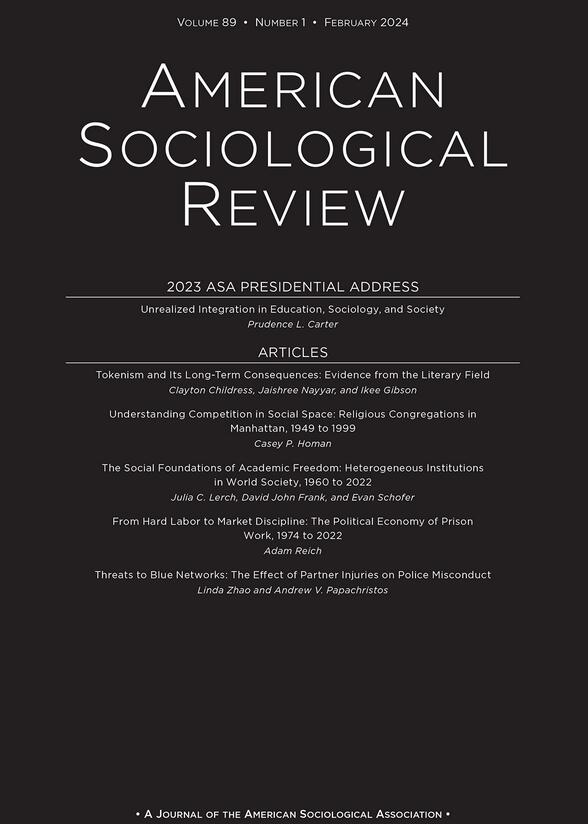When Religion Hurts: Structural Sexism and Health in Religious Congregations
IF 7.1
1区 社会学
Q1 SOCIOLOGY
引用次数: 14
Abstract
An emerging line of research has begun to document the relationship between structural sexism and health. This work shows that structural sexism—defined as systematic gender inequality in power and resources—within U.S. state-level institutions and within marriages can shape individuals’ physical health. In the present study, we use a novel dataset created by linking two nationally representative surveys (the General Social Survey and the National Congregations Study) to explore the health consequences of structural sexism within another setting: religious institutions. Although religious participation is generally associated with positive health outcomes, many religious institutions create and reinforce a high degree of structural sexism, which is harmful for health. Prior research has not reconciled these seemingly conflicting patterns. We find that among religious participants, women who attend sexist religious institutions report significantly worse self-rated health than do those who attend more inclusive congregations. Furthermore, only women who attend inclusive religious institutions exhibit a health advantage relative to non-participants. We observe marginal to no statistically significant effects among men. Our results suggest the health benefits of religious participation do not extend to groups that are systematically excluded from power and status within their religious institutions.当宗教伤害:宗教集会中的结构性性别歧视与健康
一个新兴的研究领域已经开始记录结构性性别歧视与健康之间的关系。这项研究表明,美国州级机构和婚姻中的结构性性别歧视——定义为权力和资源上的系统性性别不平等——会影响个人的身体健康。在本研究中,我们使用了一个新的数据集,该数据集是通过将两项具有全国代表性的调查(一般社会调查和全国公理会研究)联系起来创建的,以探索在另一个环境中结构性性别歧视对健康的影响:宗教机构。尽管宗教参与通常与积极的健康结果有关,但许多宗教机构制造并强化了高度的结构性性别歧视,这对健康有害。先前的研究并没有调和这些看似矛盾的模式。我们发现,在宗教参与者中,参加性别歧视宗教机构的女性自我评价的健康状况明显不如参加包容性更强的集会的女性。此外,只有参加包容性宗教机构的妇女相对于非参与者表现出健康优势。我们观察到,男性的影响微乎其微,甚至没有统计学意义。我们的研究结果表明,宗教参与对健康的益处并没有延伸到那些在宗教机构中被系统地排除在权力和地位之外的群体。
本文章由计算机程序翻译,如有差异,请以英文原文为准。
求助全文
约1分钟内获得全文
求助全文
来源期刊

American Sociological Review
SOCIOLOGY-
CiteScore
13.30
自引率
3.30%
发文量
35
期刊介绍:
The American Sociological Association (ASA) is a non-profit membership association established in 1905. Its mission is to advance sociology as a scientific discipline and profession that serves the public good. ASA is comprised of approximately 12,000 members including faculty members, researchers, practitioners, and students in the field of sociology. Roughly 20% of the members work in government, business, or non-profit organizations.
One of ASA's primary endeavors is the publication and dissemination of important sociological research. To this end, they founded the American Sociological Review (ASR) in 1936. ASR is the flagship journal of the association and publishes original works that are of general interest and contribute to the advancement of sociology. The journal seeks to publish new theoretical developments, research results that enhance our understanding of fundamental social processes, and significant methodological innovations. ASR welcomes submissions from all areas of sociology, placing an emphasis on exceptional quality.
Aside from ASR, ASA also publishes 14 professional journals and magazines. Additionally, they organize an annual meeting that attracts over 6,000 participants. ASA's membership consists of scholars, professionals, and students dedicated to the study and application of sociology in various domains of society.
 求助内容:
求助内容: 应助结果提醒方式:
应助结果提醒方式:


